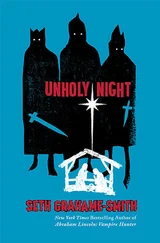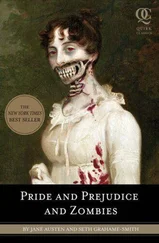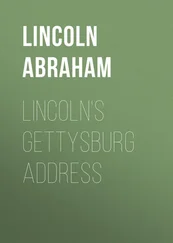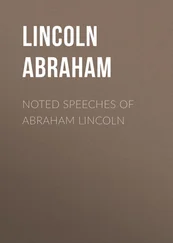He merely told the men to be on time, and to bring their nerve.
III
Abe was in fine spirits.
“Laughter shook his office door all morning,” wrote Nicolay years later. “At first I mistook the sound for something else—so accustomed had I grown to the president’s cheerlessness.” Hugh McCullough, Treasury Secretary, remembered “I never saw Mr. Lincoln so merry.” Abe had been buoyed by the reunion with his hunters, and by the telegrams flying out of the war office on an almost hourly basis. Lee had surrendered to Ulysses Grant five days earlier at the Appomattox Courthouse in Virginia, effectively bringing the war to a close. Jefferson Davis and his government were on the run.
In order to personally congratulate Ulysses Grant on his brilliant defeat of Robert E. Lee, the Lincolns had invited him and his wife to the theater that evening. There was a new comedy at Ford’s, and a few hours of carefree laughter was exactly what the president and Mrs. Lincoln needed. However, the general had respectfully declined, as he and Julia were to leave Washington by train that evening. This set off a flurry of replacement invitations, all of which were promptly (and respectfully) declined for one reason or another. “One would think that we were inviting them to an execution,” Mary is reported to have remarked during the course of the day. It mattered little to Abe. No amount of rejection—respectful or otherwise—could sully his mood that warm Good Friday afternoon.
I am strangely buoyant. [Speaker of the House Schuyler] Colfax called this morning to discuss reconstruction, and upon observing me for a quarter hour, paused and asked if I had eschewed my coffee for a Scotch—such was my disposition. Neither the Cabinet nor [Vice President Andrew] Johnson were successful in their efforts to dampen my spirits today (though both tried mightily to do so). However, I dare not speak of this happiness aloud, for Mary would surely see such boastfulness as a bad omen. It has long been her nature—and mine—to distrust these moments of quiet as prelude to some unforeseen disaster. And yet the trees bloom beautifully today, and I cannot help but take note.
The journal entry was dated April 14th, 1865. It was the last Abe would ever make.
By late afternoon, with the day’s official business done, the president prepared to take a late afternoon carriage ride with his wife. Though not as jovial as her husband, Mary also seemed to be in unusually good spirits, and she’d asked Abe to join her for a “brief turn about the yard.” As the president stepped out of the North Portico, a one-armed Union soldier (who’d been waiting there most of the day in hopes of such an encounter) shouted, “I would almost give my other hand if I could shake that of Abraham Lincoln!” Abe approached the young man and extended his hand. “You shall do that, and it shall cost you nothing.”
IV
Booth arrived in Lewis Powell’s rented room at seven o’clock sharp, accompanied by a short, nervous twenty-two-year-old pharmacist named David Herold, whom he’d met through Mary Surratt. Atzerodt was already there. Booth wasted no time.
In a few hours, the four of them would bring the Union to its knees.
At precisely ten o’clock, Lewis Powell was to kill Secretary of State William Seward, who was currently bedridden after falling from a carriage. Powell, who was unfamiliar with Washington, would be led to Seward’s house by the nervous pharmacist. After the secretary was dead, the two conspirators would ride across the Navy Yard Bridge and into Maryland, where they would meet up with Booth. At the same time, Atzerodt was to shoot Vice President Andrew Johnson in his room at the Kirkwood House, before joining the others in Maryland. As for Booth, he would return to Ford’s Theater. There, he would kill the president with a single-shot derringer pistol before plunging a knife into General Grant’s heart.
With the Union government decapitated, Jefferson Davis and his Cabinet would have time to reorganize. Confederate generals like Joseph E. Johnston, Meriwether Thompson, and Stand Watie, whose armies were fighting valiantly against the Yankee devils even now, would be able to rearm. From Maryland, Booth and his three companions would continue south, relying on the kindness of their fellow sympathizers for food and shelter while the Union pursued them. As news of their deeds spread, a chorus of joyful voices would ring from Texas to the Carolinas. The tide would turn. They would all be hailed as heroes, and John Wilkes Booth would be called “the Savior of the South.”
Atzerodt protested, insisting that he’d agreed to a kidnapping, not a murder. Booth launched into a stirring speech. There is no record of what he said—only that it was soaring and thoroughly convincing. Probably it contained references to Shakespeare. Certainly it had been rehearsed for this very occasion. Whatever Booth’s words, they worked. Atzerodt reluctantly agreed to go forward. But what the apprehensive German didn’t know—what none of the living conspirators would ever know, even as they climbed the thirteen steps to their deaths—was the truth behind the young actor’s hatred of Lincoln.

On the surface, it made no sense. John Wilkes Booth had been called the “handsomest man in America.” Audiences packed theaters all over the country to watch him perform. Women trampled one another to catch a glimpse of him. He’d been born into the nation’s preeminent acting family, and made his professional debut as a teenager. Unlike his famous older brothers Edwin and Junius, who were actors in the classic sense, John was raw and instinctive—leaping about the stage, screaming at the top of his lungs. “Every word, no matter how innocuous, seems spoken in anger,” wrote a reviewer for the Brooklyn Daily Eagle , “and yet one cannot help but be captivated by it. There is an almost ethereal quality to the gentleman.”
One night, following a performance of Macbeth at the Richmond Theater, Booth reportedly took six young ladies back to his boardinghouse and wasn’t seen for three days. He was rich. He was adored. He was doing what he loved. John Wilkes Booth should have been the happiest man alive.
But he wasn’t alive.
Life’s but a walking shadow, a poor player
That struts and frets his hour upon the stage,
And then is heard no more. It is a tale
Told by an idiot, full of sound and fury,
Signifying nothing. *
When he was thirteen years old, Johnny Booth paid an old gypsy woman to read his palm. He’d always been obsessed with fate, particularly his own—due in large part to a story often told by his eccentric mother. “On the night you were born,” she’d say, “I asked God for a sign of what awaited my newborn son. And God saw fit to answer.” For the rest of her life, Mary Ann Booth would swear that flames had suddenly leapt from the hearth of their fireplace and formed the word “country.” Johnny spent countless hours pondering the meaning of it. He knew that something special awaited him. He could feel it.
“Oh… a bad hand,” the gypsy said at once, recoiling slightly. “Sorrow and trouble… sorrow and trouble, wherever I look.” Booth had come expecting a glimpse of his future greatness. What he got were forecasts of doom. “You’ll die young,” said the gypsy, “but not before amassing a thundering crowd of enemies.” Booth protested. She was wrong! She had to be wrong! The gypsy shook her head. Nothing could prevent it….
John Wilkes Booth would “make a bad end.”
Seven years later, the first part of her grim fortune came true.

Читать дальше













